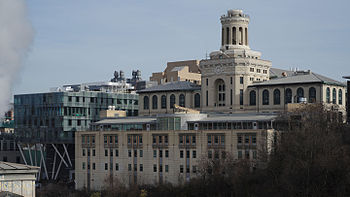Carnegie Mellon College of Engineering
40°26′32″N 79°56′47.1″W / 40.44222°N 79.946417°W
 Hamerschlag, Roberts, and Scott Halls are three major facilities of the College of Engineering | |
| Type | Private Engineering School |
|---|---|
| Established | 1905 by Andrew Carnegie |
| Dean | Bill Sanders |
| Undergraduates | 1,808 |
| Postgraduates | 1,411 |
| 718 | |
| Address | 5000 Forbes Avenue , , , |
| Campus | Urban |
| Website | engineering.cmu.edu |
The Carnegie Mellon University College of Engineering (formerly known as the Carnegie Institute of Technology) is the academic unit that manages engineering research and education at Carnegie Mellon University. The College can trace its origins from Andrew Carnegie's founding of the Carnegie Technical Schools. Today, The College of Engineering has seven departments of study and is ranked 4th nationally.[1]
History
By 1905, the massive buildings of the Carnegie Technical Schools were being constructed in a field east of the University of Pittsburgh. The first students of the School of Science and Technology began classes in unfinished buildings, still surrounded by new construction. The school initially offered two- and three-year programs to train the children of Pittsburgh's working class. After the merger between Carnegie Tech and the Mellon Institute of Industrial Research, the newly formed Carnegie Mellon University's College of Engineering and Science was divided into the Carnegie Institute of Technology (engineering) and the Mellon College of Science. Subsequently, the Carnegie Institute of Technology was re-branded as the College of Engineering.
About the College of Engineering
Enrollment for or the 2017-2018 academic year was 1,783 full-time undergraduate, 1,383 master's, and 703 doctoral students.[2] The college employs 207 faculty members whose research is recognized and supported by such sources as the National Science Foundation, the National Institutes of Health, Defense Advanced Research Projects Agency, and the Environmental Protection Agency.[3] As part of Carnegie Mellon University, the College of Engineering works to carry out the university's mission of “changing the needs of society by building on its traditions of innovation, problem-solving and interdisciplinarity”.[4]
The College's Office of the Dean is housed in Scaife Hall, and the college's primary facilities include Hamerschlag Hall, Roberts Engineering Hall, Doherty Hall, and Scott Hall, in addition to Scaife.
References
- ^ US News Engineer Ranking
- ^ "Enrollment Facts 2017 by College" (PDF). Archived from the original (PDF) on 2018-08-16. Retrieved 2018-08-16.
- ^ About the College of Engineering: distinguishing characteristics Archived July 15, 2010, at the Wayback Machine
- ^ College of Engineering vision and mission
- Fenton, Edwin (2000). Carnegie Mellon 1900-2000: A Centennial History. Pittsburgh: Carnegie Mellon University Press. ISBN 0-88748-323-2.

